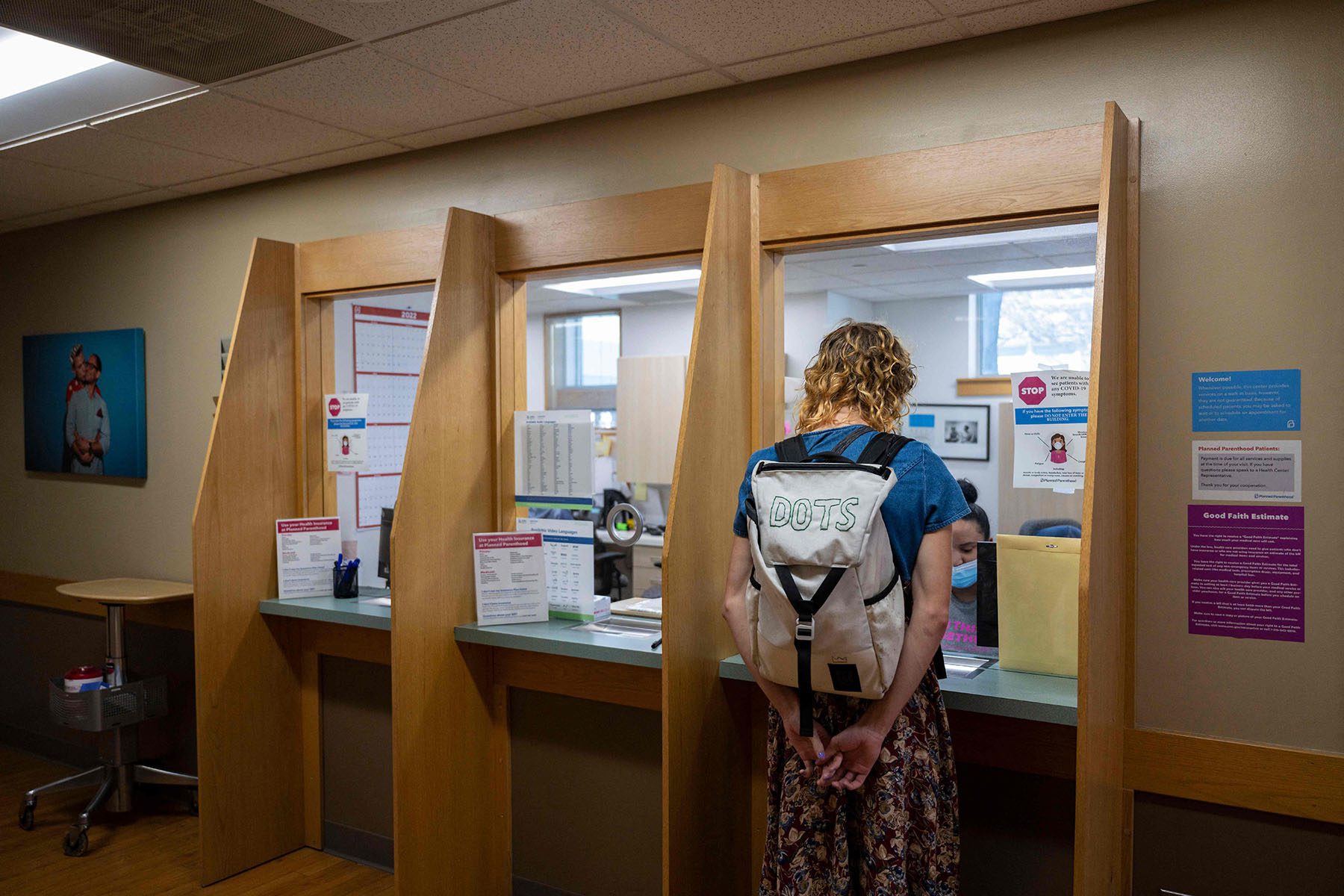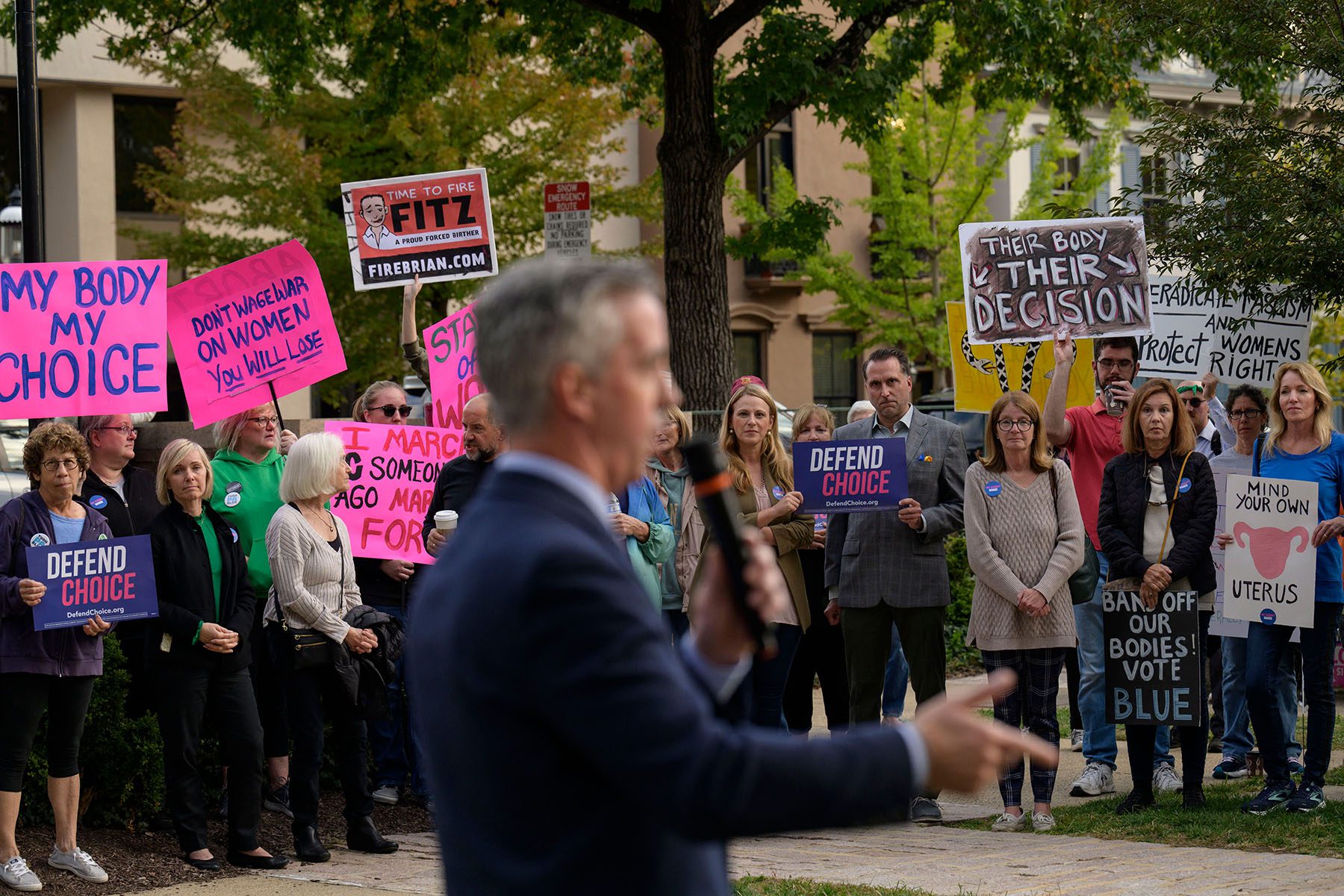We’re making sense of the midterms. Subscribe to our daily newsletter for election context and analysis.
DELAWARE AND BUCKS COUNTIES, Pa. — Democrats around the country are aiming to reverse years of eroding power in state legislatures by campaigning on abortion rights. And if they do, it’ll be candidates like Lisa Borowski in the Philadelphia suburbs leading the charge.
Borowski is running in a competitive race for state representative in a well-off area of Delaware County against Republican incumbent Chris Quinn. Quinn won reelection by just under two points in 2020 and 1.4 points in 2018, years when Democrats at the top of the ticket, including President Joe Biden, comfortably carried the county as a whole.
Borowski, who herself is married to a Republican, has long relied on people crossing party lines to elect her to local office in Radnor Township, where she serves as a ward commissioner. She’s now counting on the votes of not just Democrats, but the Republican and independent women she’s canvassed, especially older ones, who are “really concerned” about the loss of abortion rights nationally.
“Things that they had fought for, things that they thought had been decided, are being rolled back, and they are not happy about that,” Borowski told The 19th while knocking on doors in Radnor Township on Saturday morning.

Democrats in high-profile battleground races around the country, including in Pennsylvania’s Senate and gubernatorial elections, are running on abortion rights in the wake of the Supreme Court decision overturning Roe v Wade. In a Saturday night rally in Philadelphia, former President Barack Obama, President Joe Biden, and Democratic candidates Josh Shapiro and John Fetterman — running for governor and the U.S. Senate, respectively — all emphasized the elections’ implications for abortion.
But despite the focus on the top of the ticket, it’s state lawmakers — not members of Congress — who are most immediately shaping abortion access in the new post-Roe reality.
“If you’re thinking about abortion, most of where your attention should be focused is on state elections,” said Mary Ziegler, a historian at the University of California, Davis who specializes in abortion law.
One of Borowski’s supporters, an educator named Jena who lives in Radnor Township with her husband and two children, said reproductive choice, education and fiscal responsibility in government spending are among her top voting issues.
“It shouldn’t be an issue,” she said of abortion access. “Let us choose, we get to choose everything else — if I can choose to have sex, I should be able to get an abortion.”
Pennsylvania is just one state where legislative elections will have an outsized impact. Republicans currently hold the majority in both chambers, and this election will determine whether they lose or hold — or expand — that majority. So far, the state’s Democratic governor, who could not seek reelection because of term limits, has vetoed efforts to restrict abortion. But if Republicans take the governor’s mansion or significantly expand their legislative majority, they could put the state on the road to banning all or most abortions.
In North Carolina, Republicans could achieve a supermajority, allowing them to override the Democratic governor’s veto and enact abortion restrictions. Since Roe was overturned, North Carolina has seen a larger increase in abortions than any other state, a change researchers believe is a product of people now traveling to the state, one of the only in the Southeast with legal abortion, for the procedure. As recently as last year, the state’s governor vetoed multiple proposed restrictions, including one that would ban performing abortions if the provider believed the patient was motivated by the sex or race of the fetus, or if it had Down Syndrome.
Wisconsin’s Democratic governor, meanwhile, is in a tight reelection race and is focusing explicitly on abortion rights as part of his midterm pitch. There, too, Republicans could take a legislative supermajority. (A pre-Roe ban on the procedure has already cut off access in Wisconsin, though the law is being challenged in court.)
Republicans in Kansas already have a veto-proof majority, which they are expected to maintain in Tuesday’s elections, even if the state reelects Democratic Gov. Laura Kelly. The Kansas Supreme Court has held the state constitution protects abortion rights, and voters overwhelmingly rejected an effort to eliminate that protection. Still, Republicans are expected to push for some kinds of abortion restrictions this coming year.

Pennsylvania’s abortion providers are keeping an eye on the state’s legislature. A proposed amendment to the state constitution that would eliminate any state-guaranteed abortion rights needs to be passed once more by the state legislature before it is put to voters. It could appear on the state ballot as early as May 2023.
Borowski said she’s been distilling those stakes to voters she canvasses.
“I’m running against an incumbent who has been voting against abortion rights the entire time he’s been in office, for years — every abortion bill, no matter what it looks like,” Borowski said. “So communicating that to people is important, because this constitutional amendment will certainly lay the groundwork for them to continue to put bills like that on the floor.”
Pennsylvania’s state House has long been controlled by Republicans due to both partisan gerrymandering and ticket-splitting in places like the Philadelphia suburbs, which heavily swung toward Biden in 2020.
Democrats in Pennsylvania and nationwide are battling the headwinds of Biden’s unpopularity and voters’ dissatisfaction with the economy. But a new court-drawn map, in addition to the high stakes for abortion rights, puts Borowski’s district — and other competitive suburban seats like it — in contention.
In August, the number of abortions performed in the state increased by 6 percent compared with April — not as sizable a jump as seen in states like New Mexico or Kansas, but an increase still representing close to 200 more abortions. Already, the undoing of Roe v. Wade has put outsized attention on parts of this state.
The change is particularly visible in western Pennsylvania, hundreds of miles from Borowski’s race, where there are also a number of competitive state legislative races. There, Pittsburgh’s two abortion clinics — a Planned Parenthood affiliate and the independent Allegheny Reproductive Health Center — have emerged as the nearest access point for people traveling from nearby states, including West Virginia, Kentucky, Tennessee and Ohio, where a six-week abortion ban, which is currently blocked, was in effect from June 24 until September 14.
Both clinics have reported an immediate and sustained surge in patients traveling from out-of-state to seek abortion since the Supreme Court’s ruling this summer. Planned Parenthood Western Pennsylvania’s call volume has tripled, and the number of patients from Ohio increased by 30 percent, said Sydney Etheredge, the clinic’s CEO. The Allegheny Reproductive Health Center has also seen a substantial jump in out-of-state patients. Even with Ohio’s law blocked, the heightened patient volume has persisted.
“We have been seeing increased demand for sure,” Etheredge said.

Lawmakers are also expected to push other restrictions — including increased regulations on how clinics operate, or imposing limits on when in pregnancy people can get an abortion. Currently, abortion in the state is legal up to 24 weeks of pregnancy; as a state senator, Republican gubernatorial candidate Doug Mastriano was among those pushing for a law banning abortion after six weeks of pregnancy. Already, the state requires people coming for an abortion make two visits to a clinic, separated by 24 hours.
Such restrictions would have stark regional implications, with an especially acute impact in the western part of the state. Pennsylvania, which is home to 13 million people, has 17 abortion clinics. But very few are on the state’s western side. People who cannot access a timely appointment in Pittsburgh, Etheredge said, often have to look 200 miles east to Harrisburg or to another state altogether.
New restrictions could impact how many people the clinics could treat.
“The state legislature races are very top of mind,” Etheredge said. “We have seen how with state legislatures — it can be death by a thousand cuts if they are committed to restricting abortion access.”
Many voters also have the stakes of abortion access as a top priority. Borowski’s campaign manager, Amanda Hills, said several registered Republicans and independents the campaign spoke to earlier in the year said they cared first and foremost about whether Borowski supported abortion rights.
“As soon as I told them that Lisa was pro-choice or showed them on the back of the literature, how she’s wearing the pro-choice shirt, they’d be like, ‘Great, that’s all I need to know. She’s got my vote’ and the conversation was done,” Hills said. “… They understood that abortion is on the line and left up to the state legislatures. And that’s all they needed to know about Lisa and our opponent.”
One Borowski supporter in her home town told her he appreciated her being out and present in the neighborhood, jokingly asking, “Where’s Chris Quinn?” His top issue, he told her, was “getting the knuckleheads to stop their knuckleheadedness.”
About an hour away, a team of canvassers with Planned Parenthood Votes were out in the field for a last get-out-of-the-vote push, working to marshal votes for Shapiro and Fetterman.

Canvassers convened for training before heading out into the field in a meeting in a small office complex in Doylestown, the picturesque county seat of Bucks County. That afternoon, some knocked on doors in a neighborhood in nearby Warrington with all horse-themed street names. Some of the voters who answered the doors on streets like Appaloosa Road, Blackhorse Drive and Crop Circle were enthusiastic Democrats and had already voted. A few said they weren’t voting at all, saying they didn’t see a compelling reason to vote or that they disliked both candidates in the U.S. Senate race.
David, a Warrington resident canvassed by Planned Parenthood Votes who said he was voting for Fetterman and Shapiro, named “the whole women’s rights thing” as his main voting issue.
“That, and the whole Trump thing. Those guys are nuts — that’s really it,” he added.
Still, the economy and cost of living are looming large for voters. John, a Doylestown resident and retiree supporting Republicans, told The 19th his top voting issues are high inflation, border security and crime, saying, “You could be Democrat or Republican, I don’t care — you address the issues. Nobody’s tackling the issues. Everybody’s running from the issues instead.”
“Abortion is going to be up to the states, states will decide how they want to handle that — and it’s an important issue,” he said. “But there are other much more pressing things for people in order for people to live.”





